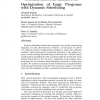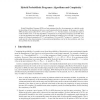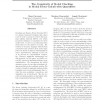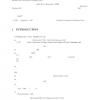136
click to vote
ICLP
1997
Springer
15 years 6 months ago
1997
Springer
Abstract This paper describes a general framework for automatic termination analysis of logic programs, where we understand by termination" the niteness of the LD-tree constru...
105
click to vote
ICLP
1997
Springer
15 years 6 months ago
1997
Springer
Hybrid Probabilistic Programs (HPPs) are logic programs that allow the programmer to explicitly encode his knowledge of the dependencies between events being described in the prog...
114
click to vote
ICLP
1997
Springer
15 years 6 months ago
1997
Springer
We provide a method whereby, given mode and (upper approximation) type information, we can detect procedures and goals that can be guaranteed to not fail (i.e., to produce at leas...
117
click to vote
ICLP
1997
Springer
15 years 6 months ago
1997
Springer
Kowalski and Sergot’s Event Calculus (EC) is a simple temporal formalism that, given a set of event occurrences, derives the maximal validity intervals (MVIs) over which propert...
118
click to vote
ICLP
1997
Springer
15 years 6 months ago
1997
Springer
This paper presents a set of techniques that makes constraint programming a technique of choice for solving small (up to 30 nodes) traveling salesman problems. These techniques in...
122
click to vote
ICLP
1997
Springer
15 years 6 months ago
1997
Springer
We introduce novel, sound, complete, and locally optimal evaluation strategies for functional logic programming languages. Our strategies combine, in a non-trivial way, two landma...
106
click to vote
ICCBR
1997
Springer
15 years 6 months ago
1997
Springer
In this paper we propose a large case-based reasoner for the legal domain. Analyzing legal texts for indexing purposes makes the implementation of large case bases a complex task. ...
113
click to vote
ICCBR
1997
Springer
15 years 6 months ago
1997
Springer
Planning by analogical reasoning is a learning method that consists of the storage, retrieval, and replay of planning episodes. Planning performance improves with the accumulationa...
ICCBR
1997
Springer
15 years 6 months ago
1997
Springer




